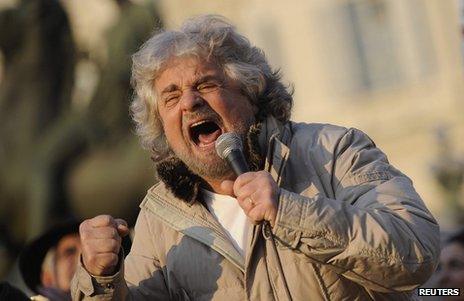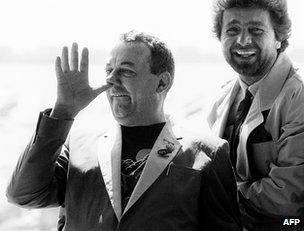Profile: Beppe Grillo
- Published

Beppe Grillo, seen here at a rally in Turin, says he has started a "war of generations"
Voice of protest for some, populist demagogue for others, comedian Beppe Grillo has become a serious political player after taking a quarter of the vote in Italy's election, with his anti-establishment Five Star Movement.
Once effectively banished from TV after sending up politicians, he has created a brand of politics all of his own, one that has propelled Five Star to third place in both houses of parliament.
Dissatisfaction with the traditional political class, both right and left, drives a party which has made the internet its medium of choice, and has sought out relative unknowns for its candidates.
At 64, the bushy-haired comic leading this new third force can still work a crowd in a piazza and inspires a wide following on social media, tickling the Italian funny bone with his jokes. He called former Prime Minister Mario Monti, for example, "Rigor Montis" for his deadly serious manner.
However, his ability to engage ultimately in the business of government in one of the eurozone's biggest economies is less clear.
For one thing, Italian TV anchors have been famously unable to grill Mr Grillo on his programme, as he shuns the television studios beloved of politicians like centre-right leader Silvio Berlusconi.
Time 'hero'
Born 21 July 1948 in the coastal city of Genoa, he trained as an accountant before taking up comedy. The divorcee and his current wife care for six children from their current and previous marriages between them.
By the late 1970s, he was a regular on public TV, appearing in variety shows.
Despite a road accident in 1980, when he was convicted of manslaughter over the deaths of three people, he was soon fronting his own shows.

Beppe Grillo (right) is seen here with French actor Coluche at the 1985 Cannes film festival
He became known for daring jokes about politicians such as Bettino Craxi, the Socialist prime minister eventually convicted of corruption.
His raw humour appears to have earned him enemies. According to a biography on his blog, external, he "fled" TV for the theatre in 1990.
As a touring act, he turned his attention to big issues like consumerism and the environment and in 2005 started his blog, one of the most popular in Italy.
Time magazine chose him, external as a "European Hero" that year, saying he used "over-the-top humour to probe the serious social issues that leaders don't want to touch".
In 2007 he organised "V-Day" - the V stands for a well-known Italian obscenity - when a petition demanding clean politics in Italy gathered 300,000 signatures in the space of a few hours.
'Lifestyle choice'
Two years later, the wealthy performer set up Five Star, which was soon polling well in local elections.
The party's logo promotes Mr Grillo's blog, making clear that it is very much the vehicle of the ageing comedian, who cannot stand for parliament himself because of his manslaughter conviction.
Mr Grillo, the BBC's Alan Johnston reported in December 2012, does not seem to have a great deal of patience for dissenting voices within the movement.
The Five Star leader is often accused of being a populist, constantly criticising the status quo but having little in the way of detailed, viable proposals for a better way forward, our Rome correspondent noted.
This lack of clarity about the party's policies has alarmed leaders in the wider eurozone, wrote the BBC's Europe editor, Gavin Hewitt.
If anything, Five Star's leader sounded even more radical at news of his party's spectacular gains.
"We've started a war of generations," he said in an audio statement on his website, which taunted the leaders of the mainstream parties.
"They are all losers, they've been there for 25 to 30 years and they've led this country to catastrophe."
Mr Grillo's followers are known as grillini or "little crickets" - his name means "cricket" in Italian - and their collective chirp can no longer be safely ignored by Italy's established parties.
"Grillo will play a decisive role," Roberto D'Alimonte, a politics professor at Rome's LUISS university, told AFP news agency.
"He has to decide whether to strike a limited agreement with the left or whether to go for fresh elections. All the cards are in his hands."
Electoral reform - he would like to halve the number of MPs and strip parties of public funding - is likely to top the list of his demands, but much is still vague.
Speaking before the election, the comedian described his party as a "lifestyle choice". "You have to participate actively in politics, change your habits: eat, travel, shop in a certain way," he was quoted as saying by AFP.
Many must now be wondering what that "certain way" represents.